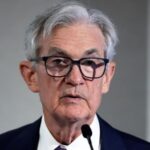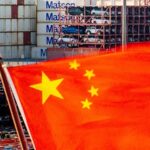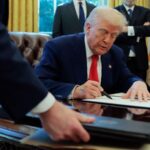The Distilled Spirits Council (DSC), a US trade group, is urging President Trump to secure a trade agreement with the EU for its sector.
The industry is getting sucked into the US-EU tariff dispute – as it was in Trump’s first term. The EU is planning to put tariffs on American whiskey in response to US steel and aluminium tariffs. That caused Trump to threaten 200% tariffs on EU alcohol entering the US.
“We want toasts not tariffs,” DSC president and CEO Chris Swonger says in a new statement sent to the BBC, adding the US spirits sector “supports more than $200 billion in economic activity, 1.7 million jobs”.
“We urge President Trump to secure a spirits agreement with the EU to get us back to zero-for-zero tariffs, which will create US jobs and increase manufacturing and exports for the American hospitality sector,” he says.
Yesterday, in response to the EU’s measures, Swonger said the US and EU spirits sectors enjoyed “fair and reciprocal” and tariff-free access between 1997 and 2018. Swonger says Transatlantic trade in spirits “increased by nearly 450% during this time”.
Swonger said the EU’s plans to tax the import of American whiskey were “disappointing” and warned they will “severely undercut the successful efforts to rebuild” those exports.
 Bernd Debusmann Jr
Bernd Debusmann Jr
Reporting from Washington
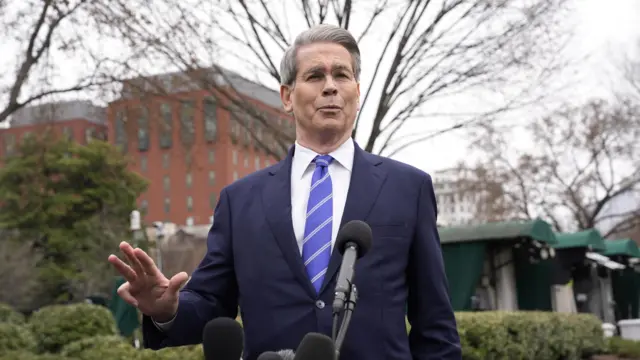 EPA
EPA
Treasury Secretary Scott Bessent spoke to reporters at the White House just a short while ago – answering a question about tariffs.
In response, Bessent repeatedly defended tariffs as being good for the US economy, saying they will ultimately “protect the American worker”.
“I’m less concerned about the short-term,” he said.
He also criticised Democrats, accusing them of threatening the US with a government shutdown.
“Democrats are in disarray,” he said. “This is the story for the next few days”.
We’ve still not heard from Donald Trump outside of his social media posts. The president has a meeting with Nato Secretary-General Mark Rutte at 12:20 EST (16:20 GMT).
The White House press pool will be attendance for a portion of that. These events often turn into extended question-and-answer sessions.
Trump doesn’t have any other public events planned today, although he is expected to have a working lunch with Rutte following the meeting.
We’ll be headed to the White House shortly and will bring you the latest from there.
Shares in some European alcohol producers have fallen after Trump threatened a 200% tariffs.
Luxury giant LVMH, which owns Hennessy cognac and several champagne houses including Dom Perignon, initially saw its shares fall by about 1.4% in afternoon trading, before a partial rebound.
Shares in French drinks group Pernod Ricard, which owns two champagne houses and Jameson Irish Whiskey, have dropped by about 3.4%.
Spirits giant Diageo, which also owns Guinness, saw a far more modest drop of 0.5%.
 Natalie Sherman
Natalie Sherman
New York business reporter
Treasury Secretary Scott Bessent has dismissed concerns about the cost of the fight, warning that a trade war was likely to inflict more economic pain on the EU than on the US.
“One or two items, with one trading bloc – I’m not sure why that’s a big deal for the markets,” he says on the US business broadcaster CNBC.
“In the event that there’s a back-and-forth with tariffs, I would counsel these government leaders that they are on the losing side economically.”
Bessent suggests there might be room for negotiation in some areas – but not steel and aluminium, which sparked the latest clash.
“We have identified some strategic industries – steel and aluminium, likely autos – but everything else is up for grabs,” he says in response to a question about the possibility of the trade fights leading to lower trade barriers.
 Paul Kirby
Paul Kirby
Europe digital editor
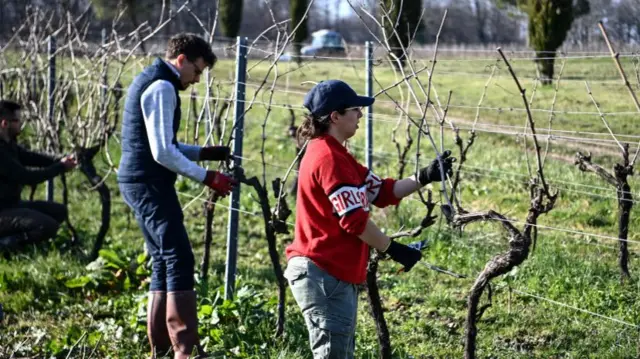 Getty Images
Getty Images
There is a consensus from drinks producers in the EU and the US that nobody stands to gain from tariffs on alcohol.
Whether it’s cognac and champagne from France or prosecco and chianti from Italy, or indeed bourbon from Louisiana, any tariffs are going to hurt.
It’s not too late to draw back, and António Costa, who’s head of the EU’s Council of 27 of member states has appealed to the US to de-escalate.
But this is a moment of jeopardy for both sides. The EU says it shares with the US “the biggest trade relationship in the world”, and Brussels argues that the EU is not the problem and it has no choice but to respond to US tariffs on steel and aluminium that came into force at midnight on Tuesday night.
President Trump is angry with the EU’s response, which will come in two steps.
Initial measures, due to come in on 1 April will hit US imports of jeans, motorbikes, peanut butter and bourbon. These were tariffs that were partly imposed during Trump’s first presidency.
But the EU is going to consult on a vast swathe of new measures too, which would come into effect in mid-April. The list is 99 pages long and could include wines and spirits alongside toilet seats, lawnmowers, swimwear and even chandeliers.
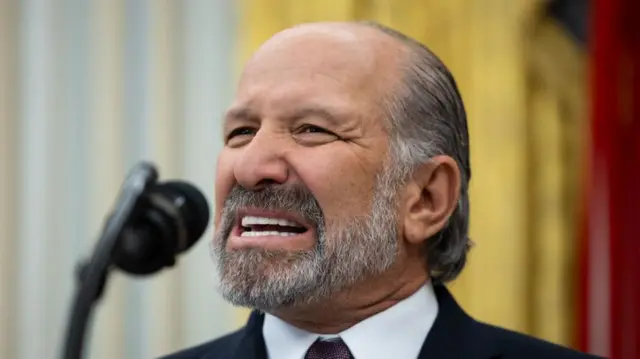 EPA
EPA
The US commerce secretary says the EU’s move to raise tariffs in response to America’s own tariffs is “disrespectful”.
Speaking to Bloomberg, Howard Lutnick says: “The president has made it crystal clear that he finds this tit-for-tat really abusive and aggravating.
“His objective is steel and aluminium tariffs. Let him build his steel and aluminium business in America, because that’s important.”
Addressing the EU response, he adds: “I find all this back-and-forth really off the topic. The key topic is rebalancing American trade.”
He says the president was “totally annoyed” at the Europeans.
“Why are Europeans picking on Kentucky bourbon or Harley-Davidson motorcycles? It’s disrespectful,” Lutnick says.
Asked about the prospect of Trump threatening his own tit-for-tat 200% tariffs on European alcohol, Lutnick says Trump makes the final decisions.
“He wants these countries to respect him. And all this showed you is that Europe and Canada do not respect Donald Trump and do not respect America’s ability to build its steel and aluminium industry, which is vital for national security ,” he says.
 Natalie Sherman
Natalie Sherman
New York business reporter
The liquor industry is familiar with the
costs of this fight.
During Trump’s first term, he hit aluminium
and steel with tariffs. It prompted retaliation from the EU, including a 25% tax
on American whiskey.
The measure led American sales of the liquor in the EU to drop 20% between 2018 and 2021, dropping from $552m (£426m) to $440m, according to the Distilled Spirits Council
of the US.
The tariff was lifted – and sales bounced
back – after the two sides struck a deal that exempted a certain amount of
European metals from the duties.
But Trump ended that carve-out on Wednesday
and has indicated little appetite for deal-making when it comes to steel and
aluminium.
The word tariff has dominated headlines all week. So let’s take a moment to unpack what tariffs are.
Essentially, tariffs are taxes charged on goods imported from other countries.
It is the company bringing the foreign goods into the country that pays the tax to the government, and firms may choose to pass on some or all of the costs to customers.
Here’s our colleague Adam Fleming to take you through the rest:
Any tariffs on US alcohol could mean a valuable market for American producers takes a serious hit.
In 2023, US spirits exports reached a record $2.2b (£1.7bn), according to the Distilled Spirits Council of the United States.
Whiskey exports alone from the US accounted for $1.4b, the Council found.
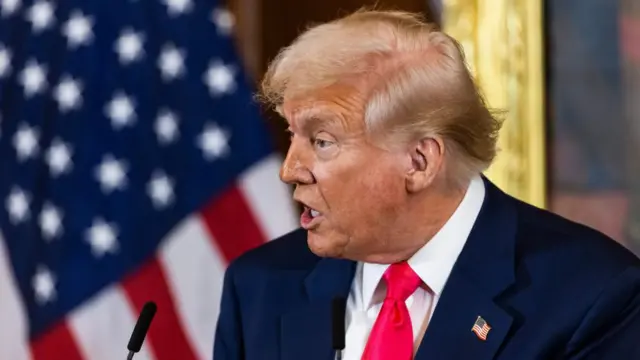 EPA
EPA
Trump has taken to social media again, following up on his earlier post threatening a 200% tariff on EU alcohol, telling Americans they ought not to fear.
In a post primarily focused on criticising the Wall Street Journal and the European Union, Trump says “have no fear, we will WIN on everything!!!”
“TARIFF RELATED MONEY IS POURING INTO THE UNITED STATES,” he says.
The president then paraphrases a previous holder of his office, Franklin Roosevelt, saying: “The only thing you have to fear, is fear itself!”
Then about 13 minutes later, he posted again.
“The U.S. doesn’t have Free Trade. We have “Stupid Trade.” The Entire World is RIPPING US OFF!!!” he said.
The focus so far today is on alcohol tariffs between the EU and the US. But the EU is not alone in planning tariffs on US alcohol.
Canada has implemented tariffs on US bourbon and has already started taking those products off store shelves. Those tariffs were in response to Trump’s import taxes on Canadian products.
The CEO of Jack Daniel’s maker Brown-Forman, Lawson Whiting, said last week the move from Canada was a “disproportionate response”.
“I mean, that’s worse than a tariff, because it’s literally taking your sales away, [and] completely removing our products from the shelves,” Whiting said on a call about earnings.
European Trade
Commission spokesman Olof Gill has just told the BBC the following:
We have no new comment on the statement by President Trump. But we can confirm that Commissioner Šefčovič reached out to his American counterparts immediately after the announcements yesterday, and calls are being prepared.”
Trump has already set a deadline of 2 April to impose more reciprocal tariffs on countries around the world.
He has yet to announce the rate of the tariffs, which he says will be tailored to each country.
The move is part of a plan that Trump signed off on in February.
“The Plan shall ensure comprehensive fairness and balance across the international trading system,” the president wrote in a memorandum.
The world’s major economic powers are now in a tit-for-tat battle over import taxes.
US President Donald Trump has pledged to impose more tariffs in a response to retaliation by the European Union and Canada.
Yesterday he told reporters at the White House: “Whatever they charge us with, we’re charging them. Nobody can complain about that.”
The tariff on Champagne and wine goes even further than that though – a 200% levy in response, Trump says, to a 50% EU tariff on US whiskey.
It’s a further escalation in a trade war which has rattled financial markets, and the stocks of alcohol companies have fallen in response to the news.
Trump’s trade tariffs are set to make make everyday goods that are imported from across the border more expensive for consumers.
This measure is generally used to encourage people to buy locally made products, which would become the cheaper option.
This graphic uses the example of shoes to highlight what that could look like.
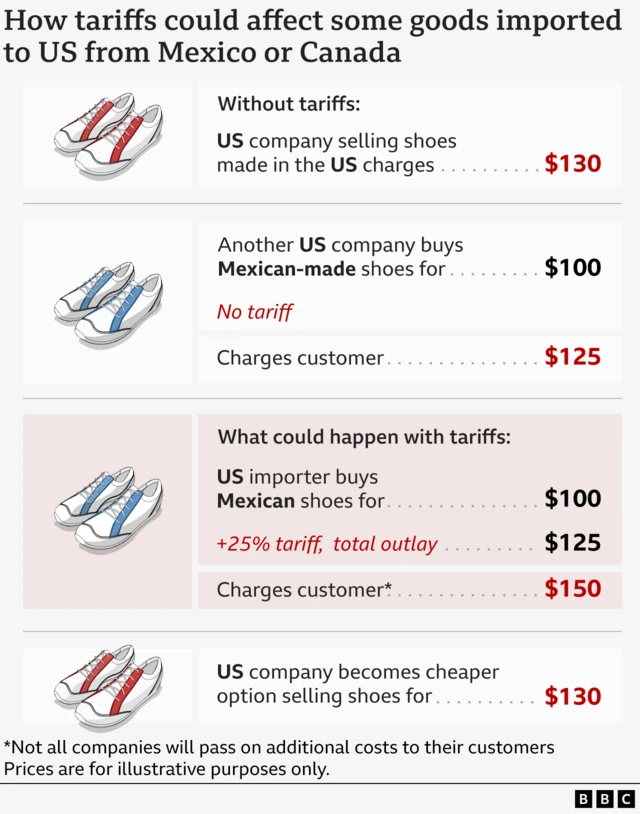
The latest phase of this global trade war kicked off when the US put a 25% tariff on all steel and aluminium coming into the US. That began on Wednesday.
The EU responded by saying it would raise its levies on up to €26bn ($28bn; £22bn) worth of US goods, including boats, bourbon and motorbikes, from 1 April.
European Commission President Ursula von der Leyen said the response was intended to be “strong but proportionate” and added that the EU stood “ready to engage in a meaningful dialogue”.
“Tariffs are taxes. They are bad for business and worse for consumers,” she said, warning the economic disruption put jobs at stake and would send prices higher.
“Nobody needs that – on both sides, neither in the European Union nor in the United States.”
More now from President Trump’s latest social media post, where he threatens a 200% tariff on EU alcohol.
Trump says if a 50% tariff on US whiskey is not removed “immediately”, the US tariff will target all wines, Champagnes and alcoholic products coming out of France and other EU represented countries.
“This will be great for the Wine and Champagne businesses in the U.S.” he says.
US President Donald Trump has threatened a 200% tariff on alcohol from EU countries unless the EU stops a “nasty 50% tariff on whisky”.
The president just posted on Truth Social, saying the move would be great for American producers.
Stick with us, more to come.
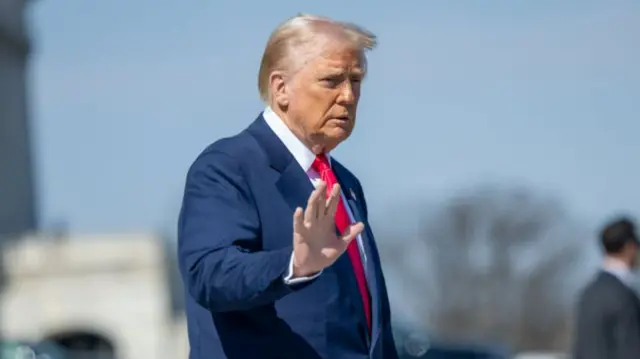 Getty Images
Getty Images
It’s been another day of dramatic and not-so-dramatic developments on the global trade front.
Donald Trump’s 25% tariffs on all aluminium and steel imports into the US was the focus of the meeting between the US president and the Irish Prime Minister Micheál Martin at the White House on Wednesday, meant to mark the upcoming St. Patrick’s Day.
The European Union has announced counter-tariffs on €26bn (£21.9bn, $28.3bn) worth of American goods, to which Trump said he would respond.
Canada announced similar measures, saying it will place similarly place tariffs on more than $20bn worth of US goods, further escalating the tariff war between the two neighbours.
UK Prime Minister Keir Starmer said his government will “keep all options on the table” when it comes to Trump’s global tariffs.
Donald Trump sees the tariffs as a key part of his economic vision to boost US manufacturing, but critics say they will raise prices for US consumers in the short term.
- We are closing our live coverage of the tariffs for now. Thank you for joining us. You can read all about the day’s developments here.
…and can Elon Musk afford a tumble in Tesla’s share price?
The world is bracing itself as Donald Trump enacts his global tariffs. As the president begins to enforce them upon the rest of the world, the Americast team assemble to ask whether Trump’s bet on tariffs might be a bad deal for the US. How have the markets reacted, and does Trump actually care?
Plus, why has Donald Trump bought a Tesla – even though he isn’t allowed to drive it?
Have a listen to the latest Americast episode below, on BBC Sounds, or wherever you find your podcasts.







